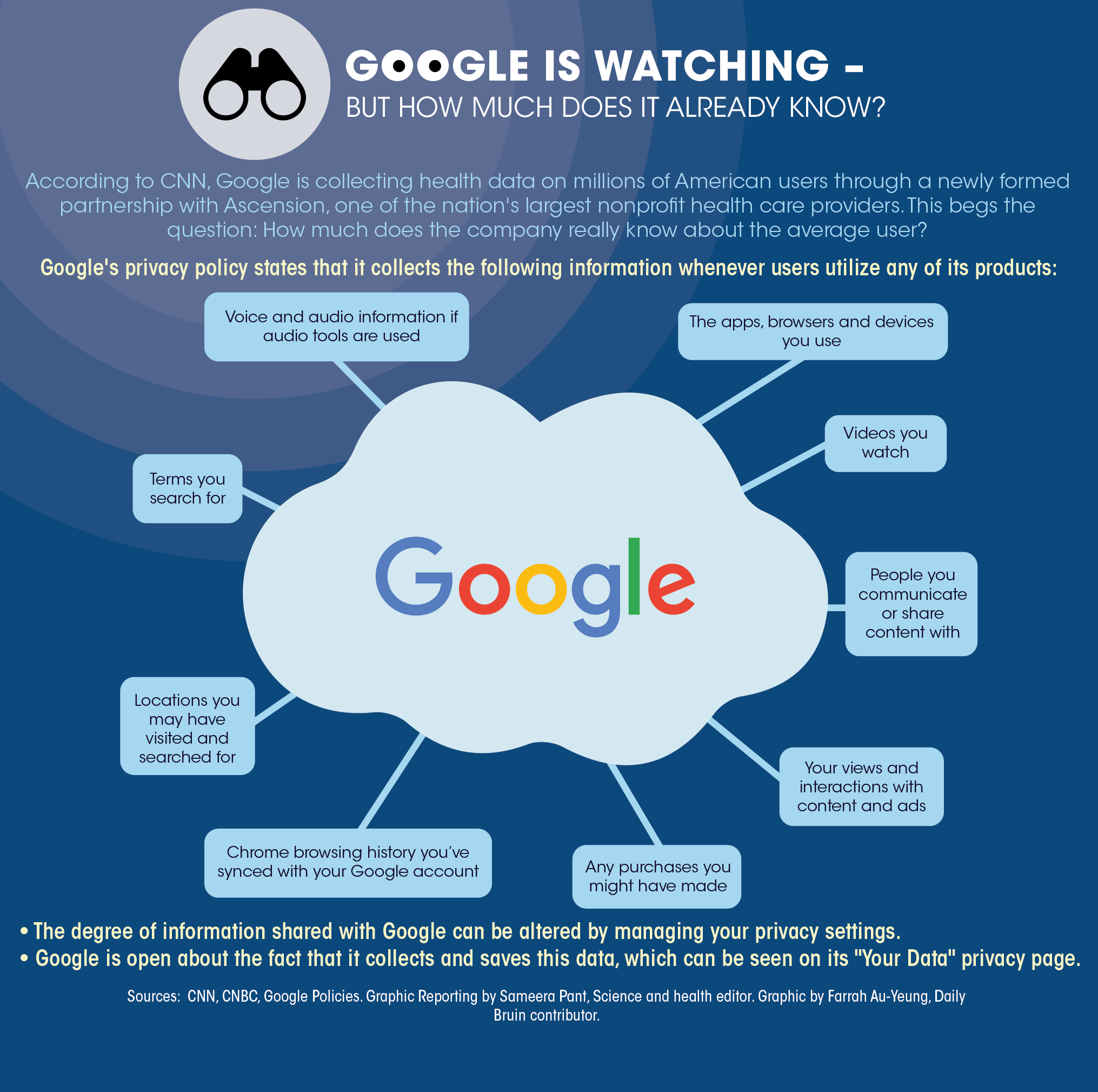Google’s expansion into health care industry draws privacy concerns


By Payton Kammerer
Nov. 27, 2019 12:29 a.m.
Google has begun its largest expansion into the health care industry yet with the acquisition of roughly 10 million patient data files and another 40 million more set to be obtained by March, prompting concern from researchers and UCLA students.
Google and the second-largest U.S. health care system, Ascension, revealed details about the expansion, titled Project Nightingale, on Nov. 11. The project is a partnership through which the Silicon Valley behemoth will store and analyze millions of Ascension’s patient records.
Since the reveal, patient privacy concerns have sparked pushback, and a federal inquiry as to whether the partnership has violated health care privacy regulations.
Fueling the controversy are an anonymous whistleblower’s reports that the data stored by Google may contain patient names. Additionally, these reports state that these names are accessible to Google’s employees, and that several of them may have downloaded some of that sensitive data.
Google isn’t the only tech company breaking into the health care market.
Arnav Garg, co-president of DataRes, a data science and analytics club at UCLA, said that other companies like Microsoft, Facebook and Apple are also collecting public health data, but aren’t facing as much scrutiny as Google.
“Your Apple Watch essentially keeps track of your health data, like heart rate, menstrual cycles, (your electrocardiogram),” said Garg, a third-year computer science student. “Apple is constantly collecting this data as well, but no one’s said anything to Apple, people are only questioning Google.”
Brynne Gosch, a public health graduate student, said the acquisition of health data by these companies carries a significant amount of potential for public benefit.
“Large datasets like this have the opportunity not only to streamline health systems, which is kind of what Ascension and Google are trying to do right now, but really bring about a lot of medical advancement and a lot of innovation and save lives,” Gosch said.
Garg said such partnerships would enable tech companies to use artificial intelligence and machine learning to find trends in data that humans might not, allowing them to develop new solutions to health care problems.
However, making positive progress in the quality of care is not the only factor making the pairings between big tech and medicine possibly beneficial for public health, Garg added.
“It has the potential to make health care more accessible, even to people who can’t afford to go to a doctor or a hospital,” said Garg.
But tech giants accumulating vast amounts of data on the public do not just stand to improve the way patients receive medical treatment, said Irene Pasquetto, a postdoctoral fellow at the John F. Kennedy School of Government at Harvard University who has used big data for her research, in an emailed statement.
“Having more data, from multiple sources, about the same subject, provide companies with a great power in terms of predicting (consumer’s) behavior and micro-targeting products,” Pasquetto, a former research assistant at the UCLA Center for Knowledge Infrastructures, said in the statement.
However, Pasquetto added that companies can acquire donated patient data from research organizations to develop products and then sell them back to those patients at steep prices, possibly through micro-targeted online advertising, profiting off patients never compensated for or informed of their data usage in the first place.
Unfortunately, for those at risk of these practices, guaranteeing the separation of a patient’s identity and their data is very difficult to do when companies like Google are involved, Garg said.
“They can track things like your location, your searches, everything on Google Docs, and then they also know (your) health care (information), and technically (they) could put location data and some of the health care data together to figure out who you are,” Garg said.
Dubious advertising practices aren’t the only risk when people’s health records are tracked back to them. Anonymity is something to be concerned about because maintaining a patient’s privacy is potentially critical for their interpersonal relationships, Gosch said.
“If people’s health data is compromised, that can affect their relationships with their family members, their communities, their employers,” Gosch said. “It affects relationships with the people most important to them.”
The current major legislation guiding medical data handling, the Health Insurance Portability and Accountability Act of 1996, doesn’t effectively address every issue that comes up, Gosch said.
The federal government needs to update these policies, Gosch added. But before it can do that, the public needs to figure out what standards for health privacy it wants. Until then, companies with access to data are left to decide how to properly handle it, Gosch said.
“At this point, society at large doesn’t fully trust large companies to handle sensitive data like health information and that’s because they haven’t really shown us so far that they are ready to be trusted,” she said.
Regardless of whether it earns your trust, Google may know more about its users than they’re aware of.
“I think that at some level, Google knows maybe more about you than you know about yourself,” Garg said.


